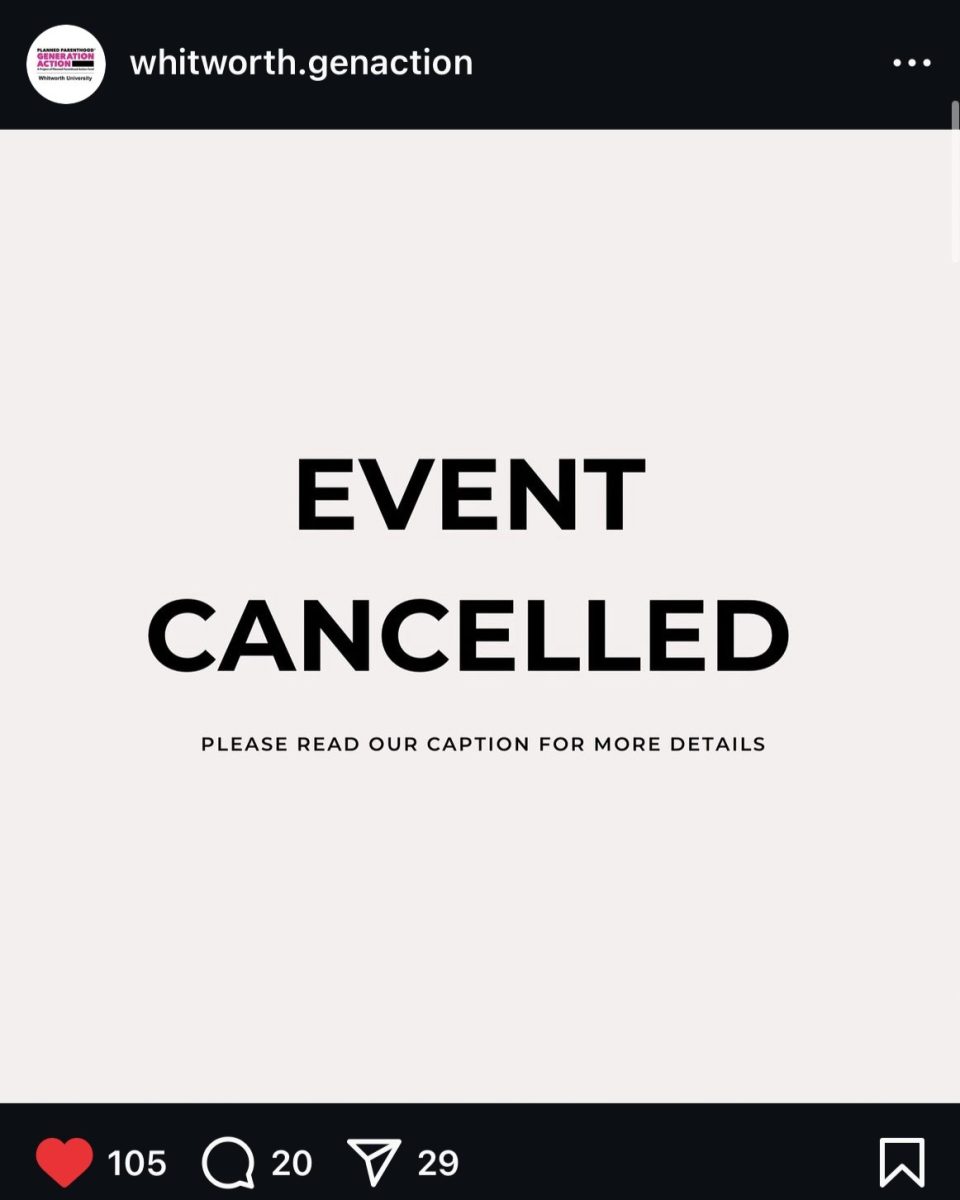The Whitworth Generation Action club announced the cancellation of their Sex in the Dark event scheduled for Oct. 17 via Instagram. “Due to significant pushback and multiple interventions from certain voices on campus [… and] given the importance of fostering a safe and open dialogue at this event, we have decided to postpone the panel until further notice,” the post explained.
The Sex in the Dark event was scheduled to take place on Oct. 17 from 7-8 p.m. and was meant to be a place “where people [could] freely ask questions about sex that they maybe have never had the chance to ask,” explained Bailey Wilmeth, outgoing president of Whitworth’s Generation Action chapter. The plan was for students to submit questions anonymously for a panel of Whitworth community members to answer.

The mission of their organization and event is to provide “everybody access [to] these resources [sexual and reproductive health resources] regardless of race, religion, gender, sexual orientation and identity,” said co-president Lizzie Berns, “not just heterosexual sexual education, but also LGBTQ education.”
“This was supposed to be an education event and not a persuasion-type event. [A space] to get your questions answered and to figure out what I need to be doing to keep myself safe and what I need to have my partner keep doing to keep myself safe, instead of bringing the narrative of that you’re supposed to be abstinent until marriage,” Berns explained.
The issue surrounding the cancelation of the event stems from a verbal agreement between Forrest Buckner, Dean of Spiritual Life and Campus Pastor, and former university president, Beck Taylor, which requires a member of the chapel to attend any event in which sex is discussed.
“About eight years ago, [President Taylor] asked me, as in charge of campus ministry, to be the one to make sure someone is saying that perspective when there’s a panel when there’s a talk [on the topic of sex],” said Buckner. The agreement was made because “we want to have someone who is providing this Christian perspective on sex [as] best enjoyed in God’s design,” he said.
Buckner explained this Christian perspective on sex to be that “God designed sex to be, to be enjoyed as a gift of two people who are in a committed covenant life, lifelong commitment, that’s how God designed sex to be enjoyed in the best way. That’s what I would say, the Christian perspective is and, I think, actually, across Whitworth, I don’t think that’s too controversial.”
However, Buckner also said, “just to be clear, we [Chapel] didn’t cancel it [the Sex in the Dark event], and we actually worked really hard to make sure we weren’t getting in the way of it happening.”
When the event was planned, Campus Pastor Lauren Taylor was set to fulfill the role of chapel member at the Sex in the Dark event but had to cancel two days before the event due to a scheduling conflict.
Sara Perez, co-president of Generation Action, explained that Taylor “would bring something valuable to the table regarding purity culture, shame within the church, [and] sexual orientation […and] we [the Generation Action team] were comfortable because she would be answering questions and she would be engaging in discussion and dialog [at the event].”
When Taylor canceled, Buckner offered to step in and fill the role of the chapel member at the event. However, the Generation Action team felt uneasy with this change due to a lack of clarity and communication.
Wilmeth further explained that this change in chapel representation led the team to cancel the event “because we would rather not have the event at all than give a platform to someone like Forrest Buckner, who’s potentially dangerous to our mission and to what we represent as a club.” The Generation Action team felt that Buckner’s definition of the Christian perspective on sex was inconsistent with the goal of the event.
Dr. Erika Miley (Whitworth BA ‘07 and MA ‘15), an adjunct professor at Whitworth who was set to be one of the panelists at the event, emphasized the importance of sex education, especially in Christian circles. Miley teaches a class on sex and society and is also a licensed Mental Health Therapist and certified Clinical Sexologist.
She explained that in her work as a counselor and sexologist, “I cannot tell you how many of my patients that have come to me, Christians, who waited to have ‘sex’ until marriage. They come to me because they are wanting to get pregnant and are having conflict because pregnancy has not happened yet.”
She continued, “I ask them what does it mean to try and get pregnant to them. And both of them tell me how they are having sex and are not putting a penis inside a vagina to have ‘sex.’ They truly believed what they were doing was having ‘sex’ but what they were doing could not bring the sperm cell and egg cell together.”
She further explained that a lack of sexual education during her time at Whitworth perpetuated a lack of understanding of her own body as well. During her time as a student at Whitworth, “Quite often the answer I heard as a student was sex was to be within a marriage. But that was all. It did not help me as a student understand my body, [or] how to understand [the] sexual relationship with my eventual marriage partner.”
Despite the pushback from the Generation Action team, Buckner articulated that Chapel does have a meaningful role in “add[ing] a voice that thinks about the why of sex, the purpose of sex [and] the emotional, spiritual elements [of sex]” further stating that “we [Chapel staff] don’t want to be the police about sex education on campus. […] Instead, we want to be able to be add something that is beneficial to the conversation.”
While it seems that disagreement regarding the Christian perspective of marriage ultimately led the Generation Action team to cancel the event, not having the event at all leaves students with even fewer resources in terms of sexual and reproductive health.
On a Christian campus like Whitworth, where discussions of sex and reproductive health are generally considered to be taboo, spaces like Sex in the Dark are crucial to breaking this stigma. Ultimately, because Christians have differing perspectives on how these topics should be handled, creating space to talk about Christian perspectives and to provide educational opportunities is vital. Even if students plan to wait until marriage to have sex, Dr. Miley’s example highlights the importance of talking about it, whether or not one directly agrees with the beliefs being presented.
Talking about the “hows” and “whys” of sex, even if someone isn’t sexually active, provides spaces for students to learn about their own bodies and how to protect themselves and others.
For those seeking sexual and reproductive health resources, students have a couple of options. First, Whitworth’s health center provides access to “well-person exams, sexual and reproductive health care education, breast health care, access to contraception, sexually transmitted infection (STI) care and more,” Explained Kristiana Holmes, DNP, APRN, FNP-BC, who serves as Whitworth’s Director of Health Services. All of which is “inclusive, gender-affirming, respectful, and provided to all students,” furthered Holmes. Students can also reach out to Whitworth’s counseling center and can receive up to 10 counseling sessions free of charge.
Additionally, the chapel runs a variety of different small groups aimed at creating space for healing from sexual brokenness or trauma. These include groups like Redeemed Sexuality, which is an all-women’s group focused on creating space to hear the stories of women who have experienced sexual abuse or violence. Chapel also offers a small group called Redefined, which is a story-sharing small group for LGBTQ+ Christians to come together and discuss what it looks like to be queer Christians.







